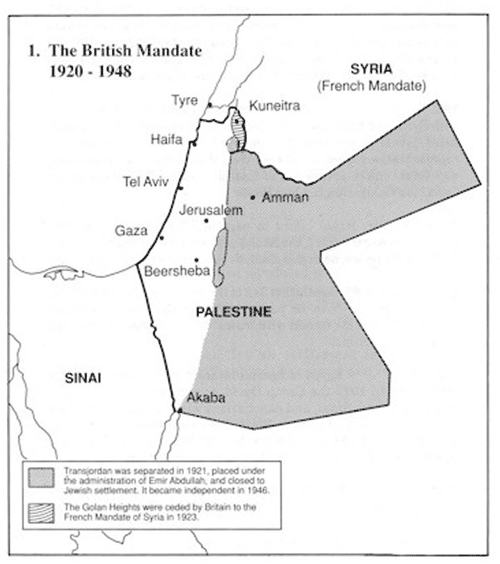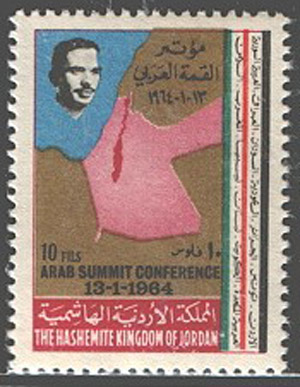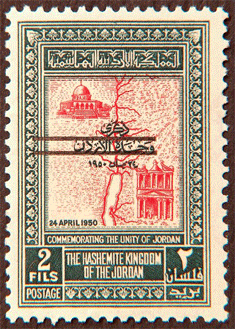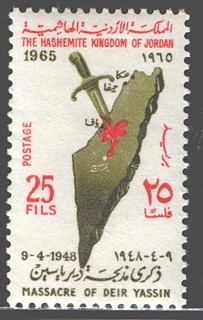JORDAN
Map
Geography
People
Economy Military
Lib
of Congr Country Study
Occupied
and annexed Arab Palestinians in West Bank from 1948-1967
Attacked Israel in 1948 with the declared intent of destroying her
Jordan got at first 77% of original
1922 Palestine Mandate (120,000 sq km), occupied
the West Bank in 1948, annexed her in 1950, claimed in 1964
the full 100% including Israel and the then Egyptian occupied Gaza
Strip:

Prohibited
citizenship for Jews
Prohibited
selling land to Jews and executed violators, from 1995 "it
is impermissible for foreign persons or corporate entities that
do not hold an Arab nationality to purchase, lease, or own directly
or indirectly any immovable property"
Arab Hashemites rule Palestinian majority - Discrimination of Palestinians
Arab Palestinian assassinated in 1951 Jordanian king
Civil war with Palestinians and invasion by Arab Syria (Black September
1970)
Impunity for "honor" killings
of women - Women have no right to divorce
Restrictions on freedom of speech, press, assembly and association
Peace treaty with Israel since 1994
Agreement of trade and economic cooperation with Israel since 1995
Arab
Jordan demands land back from Arab Syria
Arab
Jordan occupies land belonging to Arab Syria
 Compare
Freedom Score of Jordan (Partly
Free) and Israel (Free) Compare
Freedom Score of Jordan (Partly
Free) and Israel (Free)
Source: Freedom House (PDF, 187
KB)
 Compare
Human Development Index of Jordan
(0.743) and Israel (0.905) (PDF,
670 KB) Compare
Human Development Index of Jordan
(0.743) and Israel (0.905) (PDF,
670 KB)
Source: United Nations Human
Development Report 2003
 Compare
Corruption Index of Jordan (4.5),
Israel (7.3), Germany (7.3) and USA (7.7) Compare
Corruption Index of Jordan (4.5),
Israel (7.3), Germany (7.3) and USA (7.7)
Source: Transparency International (PDF,
1.8 MB)
 The
case against Jordan (Alan M. Dershowitz, professor of law at Harvard,
JP, Oct. 7, 2003): "Jordan
has a law on its books explicitly prohibiting any Jew from becoming
a citizen, or any Jordanian from selling land to a Jew.
It has refused to amend this law despite repeated demands. The
case against Jordan (Alan M. Dershowitz, professor of law at Harvard,
JP, Oct. 7, 2003): "Jordan
has a law on its books explicitly prohibiting any Jew from becoming
a citizen, or any Jordanian from selling land to a Jew.
It has refused to amend this law despite repeated demands.
Jordan
has perfected the art of torture and uses it routinely against dissidents,
suspected terrorists and perceived opponents of the monarchy.
I'm talking about real torture here, not the kind of rough interrogation
occasionally employed by the US and Israel. Jordan even threatens
to torture and tortures the entirely innocent relatives of suspected
terrorists, as it did with Abu Nidal's mother. ...
Jordan
killed more Palestinians in one month September 1970, known as Black
September than Israel has killed during the three years of suicide
bombings that began in the fall of 2000. The brutality of the Jordanian
Army toward Palestinian dissidents and terrorists was far more egregious
than anything Israel has ever done.
The
Jordanian Army has deliberately bombed civilian areas of Israeli
cities in clear violation of international law. In
1967, before Israel fired a single shot at Jordan, the Jordanian
Army fired 1,600 missiles into west Jerusalem, targeting apartment
buildings, shops and other non-military targets. Israel did not
respond by bombing Amman, which it easily could have done. It responded
by attacking Jordanian military targets and then offering a cease-fire,
which Jordan rejected.
JORDAN IS not a democracy. It is
a hereditary monarchy which stifles dissent, freedom of speech and
freedom of the press. Its democratic facades a legislature, cabinet,
judiciary are all subject to control by the Hashemite minority rulers
who were placed in charge of the majority Palestinian population
by a colonial decision."
 Jordanian
Nationality Law (Law No. 6 of 1954, last amended 1987), Article
3: "The following shall be deemed to be Jordanian nationals:
... (2)Any person who, not being
Jewish, .." Jordanian
Nationality Law (Law No. 6 of 1954, last amended 1987), Article
3: "The following shall be deemed to be Jordanian nationals:
... (2)Any person who, not being
Jewish, .."
 Discrimination
of Palestinian Majority (Country Reports on Human Rights Practices,
Jordan - 2001 - Bureau of Democracy, Human Rights, and Labor of
U.S. Department of State):
"Palestinians residing in
Jordan, who make up more than half of the population, suffer discrimination
in appointments to positions in the Government and the military,
in admittance to public universities, and in the granting of university
scholarships. The Government granted citizenship to all Palestinians
who fled to Jordan in the period after the 1948 Arab-Israeli war,
and to a large number of refugees and displaced persons who arrived
as a result of the 1967 war. However, most refugees who fled Gaza
after 1967 are not entitled to citizenship and are issued 2-year
passports valid for travel only. In 1995 then-King Hussein announced
that West Bank residents without other travel documentation would
be eligible to receive 5-year Jordanian passports. However, the
Government has emphasized that these passports are for travel only
and do not connote citizenship ..." Discrimination
of Palestinian Majority (Country Reports on Human Rights Practices,
Jordan - 2001 - Bureau of Democracy, Human Rights, and Labor of
U.S. Department of State):
"Palestinians residing in
Jordan, who make up more than half of the population, suffer discrimination
in appointments to positions in the Government and the military,
in admittance to public universities, and in the granting of university
scholarships. The Government granted citizenship to all Palestinians
who fled to Jordan in the period after the 1948 Arab-Israeli war,
and to a large number of refugees and displaced persons who arrived
as a result of the 1967 war. However, most refugees who fled Gaza
after 1967 are not entitled to citizenship and are issued 2-year
passports valid for travel only. In 1995 then-King Hussein announced
that West Bank residents without other travel documentation would
be eligible to receive 5-year Jordanian passports. However, the
Government has emphasized that these passports are for travel only
and do not connote citizenship ..."
 Country
Reports on Human Rights Practices, Jordan - 2001 (Bureau of Democracy,
Human Rights, and Labor of U.S. Department of State): "There
are significant restrictions on citizens' right to change their
Government. Citizens may participate in the political system through
their elected representatives in Parliament; however, the King has
discretionary authority to appoint and dismiss the Prime Minister,
Cabinet, and upper house of Parliament, to dissolve Parliament,
and to establish public policy. Other human rights problems included
police abuse and mistreatment of detainees; allegations of torture;
arbitrary arrest and detention; lack of transparent investigations
and accountability within the security services; prolonged detention
without charge; denial of due process of law stemming from the expanded
authority of the State Security Court and interference in the judicial
process; infringements on citizens' privacy rights; harassment of
members of opposition political parties; and significant restrictions
on freedom of speech, press, assembly, and association. A law enacted
by the Government in October gave the Government broad powers to
restrict and prosecute journalists and close publications. This
law effectively superseded the 1999 amendments to the Press and
Publications Law, which had reduced somewhat the restrictions in
previous laws regarding the ability of journalists and publications
to function and report freely; however, significant restrictions
continued to be in effect. The Government limits academic freedom.
The Government imposes some limits on freedom of religion, and there
is official and societal discrimination against adherents of unrecognized
religions. The evangelical Christian community reported fewer incidents
of governmental harassment during the year. There are some restrictions
on freedom of movement. Violence against women, restrictions on
women's rights, and societal discrimination against women are problems.
The law still allows for reduced punishments for violent "honor
crimes" against women for alleged immoral acts. Child abuse
remains a problem, and discrimination against Palestinians persists.
Abuse of foreign domestic servants is a problem, and child labor
occurs ... Women experience legal discrimination in matters of pension
and social security benefits, inheritance, divorce, and the value
of court testimony. In Shari'a courts, a woman's testimony is worth
only half that of a man (see Section 1.e.). The Government provides
men with more generous social security benefits than women. The
Government continues pension payments of deceased male civil servants
to their heirs but discontinues payments of deceased female civil
servants. Current laws and regulations governing health insurance
for civil servants do not permit women to extend their health insurance
coverage to dependents or spouses. However, divorced and widowed
women may extend coverage to their children ... Under
Shari'a as applied in the country, female heirs receive half the
amount of male heirs and the non-Muslim widows of Muslim spouses
have no inheritance rights .. The law requires a married woman to
obtain her husband's permission to obtain a passport." Country
Reports on Human Rights Practices, Jordan - 2001 (Bureau of Democracy,
Human Rights, and Labor of U.S. Department of State): "There
are significant restrictions on citizens' right to change their
Government. Citizens may participate in the political system through
their elected representatives in Parliament; however, the King has
discretionary authority to appoint and dismiss the Prime Minister,
Cabinet, and upper house of Parliament, to dissolve Parliament,
and to establish public policy. Other human rights problems included
police abuse and mistreatment of detainees; allegations of torture;
arbitrary arrest and detention; lack of transparent investigations
and accountability within the security services; prolonged detention
without charge; denial of due process of law stemming from the expanded
authority of the State Security Court and interference in the judicial
process; infringements on citizens' privacy rights; harassment of
members of opposition political parties; and significant restrictions
on freedom of speech, press, assembly, and association. A law enacted
by the Government in October gave the Government broad powers to
restrict and prosecute journalists and close publications. This
law effectively superseded the 1999 amendments to the Press and
Publications Law, which had reduced somewhat the restrictions in
previous laws regarding the ability of journalists and publications
to function and report freely; however, significant restrictions
continued to be in effect. The Government limits academic freedom.
The Government imposes some limits on freedom of religion, and there
is official and societal discrimination against adherents of unrecognized
religions. The evangelical Christian community reported fewer incidents
of governmental harassment during the year. There are some restrictions
on freedom of movement. Violence against women, restrictions on
women's rights, and societal discrimination against women are problems.
The law still allows for reduced punishments for violent "honor
crimes" against women for alleged immoral acts. Child abuse
remains a problem, and discrimination against Palestinians persists.
Abuse of foreign domestic servants is a problem, and child labor
occurs ... Women experience legal discrimination in matters of pension
and social security benefits, inheritance, divorce, and the value
of court testimony. In Shari'a courts, a woman's testimony is worth
only half that of a man (see Section 1.e.). The Government provides
men with more generous social security benefits than women. The
Government continues pension payments of deceased male civil servants
to their heirs but discontinues payments of deceased female civil
servants. Current laws and regulations governing health insurance
for civil servants do not permit women to extend their health insurance
coverage to dependents or spouses. However, divorced and widowed
women may extend coverage to their children ... Under
Shari'a as applied in the country, female heirs receive half the
amount of male heirs and the non-Muslim widows of Muslim spouses
have no inheritance rights .. The law requires a married woman to
obtain her husband's permission to obtain a passport."
 Jordanian
Parliament Supports Impunity For Honor Killings (Human Rights Watch):
(Washington DC, January 27, 2000) -- Human Rights Watch today
condemned the failure of the Jordanian Lower House to end impunity
for men who murder female family members in the name of preserving
the "honor" of the family. "For
too long, men in Jordan have been getting away with murder,"
said Regan Ralph, executive director of the Women's Rights Division
at Human Rights Watch. "This vote is a slap in the face of
Jordanian women who have been organizing to stop the killings."
... This is the second time in two months that the Jordanian Lower
House has failed to abolish Article 340 of the Penal Code, which
provides for lenient sentences when men kill their female relatives
in the name of "honor." Parliamentarians
justified their defense of honor killings as protection of Jordan's
traditional and moral values against western influences.
... Human Rights Watch further
called on the Jordanian parliament to provide protection for women
threatened by their family members on the basis of "honor,"
and to abolish other laws that discriminate against women, including
the rape law, citizenship law, passport law, and social security
law." Jordanian
Parliament Supports Impunity For Honor Killings (Human Rights Watch):
(Washington DC, January 27, 2000) -- Human Rights Watch today
condemned the failure of the Jordanian Lower House to end impunity
for men who murder female family members in the name of preserving
the "honor" of the family. "For
too long, men in Jordan have been getting away with murder,"
said Regan Ralph, executive director of the Women's Rights Division
at Human Rights Watch. "This vote is a slap in the face of
Jordanian women who have been organizing to stop the killings."
... This is the second time in two months that the Jordanian Lower
House has failed to abolish Article 340 of the Penal Code, which
provides for lenient sentences when men kill their female relatives
in the name of "honor." Parliamentarians
justified their defense of honor killings as protection of Jordan's
traditional and moral values against western influences.
... Human Rights Watch further
called on the Jordanian parliament to provide protection for women
threatened by their family members on the basis of "honor,"
and to abolish other laws that discriminate against women, including
the rape law, citizenship law, passport law, and social security
law."
 Honor
killing in national legal codes (Wikipaedia, Jul 19, 2006):
Part of article 340 of the Jordanian Penal Code states that "he
who discovers his wife or one of his female relatives committing
adultery and kills, wounds, or injures one of them, is exempted
from any penalty." Honor
killing in national legal codes (Wikipaedia, Jul 19, 2006):
Part of article 340 of the Jordanian Penal Code states that "he
who discovers his wife or one of his female relatives committing
adultery and kills, wounds, or injures one of them, is exempted
from any penalty."
 Jordanian
parliament rejection of two provisional laws on the right of the
woman to get divorced and so-called "honor killing." (ArabicNews,
Aug 11, 2003) Jordanian
parliament rejection of two provisional laws on the right of the
woman to get divorced and so-called "honor killing." (ArabicNews,
Aug 11, 2003)
 Amnesty
International Report 2002 (Jordan): "Hundreds
of people, including prisoners of conscience, were arrested for
political reasons. There were reports of torture and ill-treatment
of detainees by members of the security services. Trials
of most of those charged with political offences continued to be
heard before the State Security Court whose procedures did not meet
international fair trial standards. Around 13 people were sentenced
to death and at least nine people were executed. There were at least
19 cases of family or ''honour'' killings. Three people linked to
Islamist groups remained in forcible exile." Amnesty
International Report 2002 (Jordan): "Hundreds
of people, including prisoners of conscience, were arrested for
political reasons. There were reports of torture and ill-treatment
of detainees by members of the security services. Trials
of most of those charged with political offences continued to be
heard before the State Security Court whose procedures did not meet
international fair trial standards. Around 13 people were sentenced
to death and at least nine people were executed. There were at least
19 cases of family or ''honour'' killings. Three people linked to
Islamist groups remained in forcible exile."
 AN
INTERIM REPORT ON THE CIVIL ADMINISTRATION OF PALESTINE (Herbert
Samuel, British High Commisioner, 1921): "Included
in the area of the Palestine Mandate is the territory of Trans-Jordania.
It is bounded on the north by the frontier of Syria, placed under
the mandate of France; on the south by the kingdom of the Hejaz;
and on the west by the line of the Jordan and the Dead Sea; while
on the east it stretches into the desert and ends--the boundary
is not yet defined--where Mesopotamia begins." AN
INTERIM REPORT ON THE CIVIL ADMINISTRATION OF PALESTINE (Herbert
Samuel, British High Commisioner, 1921): "Included
in the area of the Palestine Mandate is the territory of Trans-Jordania.
It is bounded on the north by the frontier of Syria, placed under
the mandate of France; on the south by the kingdom of the Hejaz;
and on the west by the line of the Jordan and the Dead Sea; while
on the east it stretches into the desert and ends--the boundary
is not yet defined--where Mesopotamia begins."

 In
July 1922, the League of Nations entrusted Great Britain with the
Mandate
for Palestine, that incorporated the Balfour
Declaration, and charged the Mandatory to secure the Jewish
National Home while safeguarding the civil and religious rights
of all inhabitants of Palestine, irrespective of race and religion.
Recognizing "the historical connection of the Jewish people
with Palestine," Great Britain was called upon to facilitate
the establishment of a Jewish national home in Palestine. The
area of the Palestine Mandate included the territory of "Trans-Jordania"
(Art
25 of the Mandate for Palestine). In
July 1922, the League of Nations entrusted Great Britain with the
Mandate
for Palestine, that incorporated the Balfour
Declaration, and charged the Mandatory to secure the Jewish
National Home while safeguarding the civil and religious rights
of all inhabitants of Palestine, irrespective of race and religion.
Recognizing "the historical connection of the Jewish people
with Palestine," Great Britain was called upon to facilitate
the establishment of a Jewish national home in Palestine. The
area of the Palestine Mandate included the territory of "Trans-Jordania"
(Art
25 of the Mandate for Palestine).
In September 1922, the League of Nations and Great Britain decided
that the provisions for setting up a Jewish national home would
not apply to "Transjordan", which
constituted three-fourths of the Mandate for Palestine territory
and which eventually became the Kingdom
of Jordan. See
Palestine Order in Council (Aug 14, 1922): "This
Order In Council Shall Not Apply To Such Parts Of The Territory
Comprised In Palestine To The East Of The Jordan". Therefore,
in many ways, Jordan is actually an Arab Palestinian state with
an Arab Palestinian majority ruled by an Arab dynasty.
  Jordanian
stamp from 1950: The Jordanian occupation and official annexation
of the West Bank and East-Jerusalem with the Dome of the Rock (all
these were never before Jordanian) is called "Unity of Jordan".
The Jordan River and the Death Sea are shown in the center of the
country; in reality, the areas west of the Jordan River and the
Death Sea never belonged to Jordan. Jordanian
stamp from 1950: The Jordanian occupation and official annexation
of the West Bank and East-Jerusalem with the Dome of the Rock (all
these were never before Jordanian) is called "Unity of Jordan".
The Jordan River and the Death Sea are shown in the center of the
country; in reality, the areas west of the Jordan River and the
Death Sea never belonged to Jordan.
 1964
Palestine Liberation Organization Covenant, article 24: “This
Organization [the PLO] does not exercise any regional sovereignty
over the West Bank in the Hashemite Kingdom of Jordan, in the Gaza
Strip or the Himmah area.” 1964
Palestine Liberation Organization Covenant, article 24: “This
Organization [the PLO] does not exercise any regional sovereignty
over the West Bank in the Hashemite Kingdom of Jordan, in the Gaza
Strip or the Himmah area.”
 King
Hussein of Jordan, official website, Jan 7, 2006): "In
1950, a Jordanian parliament in which Palestinian Arabs from the
West Bank were equally represented voted unanimously to unite the
West Bank of the Jordan River with the Hashemite Kingdom of Jordan
in order to safeguard the remaining Arab territory of Palestine
from Zionist expansion. ... [On July 30, 1988 the Jordanian King
Hussein - MEI] formally dissolved Parliament, ending West Bank representation
in the legislature. Finally, on July 31 he announced the severance
of all administrative and legal ties—with the exception of
guardianship over the Muslim Holy Sites of Jerusalem—with
the occupied West Bank." King
Hussein of Jordan, official website, Jan 7, 2006): "In
1950, a Jordanian parliament in which Palestinian Arabs from the
West Bank were equally represented voted unanimously to unite the
West Bank of the Jordan River with the Hashemite Kingdom of Jordan
in order to safeguard the remaining Arab territory of Palestine
from Zionist expansion. ... [On July 30, 1988 the Jordanian King
Hussein - MEI] formally dissolved Parliament, ending West Bank representation
in the legislature. Finally, on July 31 he announced the severance
of all administrative and legal ties—with the exception of
guardianship over the Muslim Holy Sites of Jerusalem—with
the occupied West Bank."
 Of
the original 1922 League of Nations
Palestine Mandate to establish the Jewish National Home (120,000
sq km), Israel
received only 17% (20,330 sq km), while Arab
Jordan received 77% (91,971 sq km). Golan
Heights (1,200 sq km): 1%. Of
the original 1922 League of Nations
Palestine Mandate to establish the Jewish National Home (120,000
sq km), Israel
received only 17% (20,330 sq km), while Arab
Jordan received 77% (91,971 sq km). Golan
Heights (1,200 sq km): 1%.
The remaining 5% are today the West
Bank (5,860 sq km) and Gaza Strip (360 sq km) under Israeli
or Arab Palestinian
rule,
their current
status subject to the Israeli-Palestinian Interim Agreement, their
permanent status to be determined through further negotiation.
Their total area of 6,220 sq km is matching equivalent to a circle
with a radius of only 45 km. This is 1/2400 (0.04%!) of the
total area of the Arab world & Iran (15.15 million sq km).
 Black
September in Jordan 1970-1971 (OnWar): During a bitterly fought
ten-day civil war, primarily between the PLA [Palestinian Liberation
Army] and Jordan Arab Army, Syria sent about 200 tanks to aid the
fedayeen. ... Under attack from the Jordanian army and in response
to outside pressures, the Syrian forces began to withdraw from Jordan
on September 24, having lost more than half their armor in fighting
with the Jordanians. ... Al Fatah abandoned its earlier posture
of noninvolvement in the internal affairs of an Arab state and issued
a statement demanding the overthrow of the Jordanian "puppet
separatist authority." In a subsequent early May [1971] statement,
it called for "national rule" in Jordan. Against this
background of threats to his authority, [King] Hussein struck at
the remaining guerrilla forces in Jordan. ... Hussein became virtually
isolated from the rest of the Arab world, which accused him of harsh
treatment of the [Palestinian] fedayeen and denounced him as being
responsible for the deaths of so many of his fellow Arabs." Black
September in Jordan 1970-1971 (OnWar): During a bitterly fought
ten-day civil war, primarily between the PLA [Palestinian Liberation
Army] and Jordan Arab Army, Syria sent about 200 tanks to aid the
fedayeen. ... Under attack from the Jordanian army and in response
to outside pressures, the Syrian forces began to withdraw from Jordan
on September 24, having lost more than half their armor in fighting
with the Jordanians. ... Al Fatah abandoned its earlier posture
of noninvolvement in the internal affairs of an Arab state and issued
a statement demanding the overthrow of the Jordanian "puppet
separatist authority." In a subsequent early May [1971] statement,
it called for "national rule" in Jordan. Against this
background of threats to his authority, [King] Hussein struck at
the remaining guerrilla forces in Jordan. ... Hussein became virtually
isolated from the rest of the Arab world, which accused him of harsh
treatment of the [Palestinian] fedayeen and denounced him as being
responsible for the deaths of so many of his fellow Arabs."
 The
End of 'Arafat'. Even if he lives, the idea of him must die. (Wall
Street Journal, Sep 17, 2003): "If you look at the Nobel
Prizes' own biography of Yasser Arafat, you find this remarkable
sentence toward the end: 'Like other Arab regimes in the area, however,
Arafat's governing style tended to be more dictatorial than democratic.'
That is to say, Arafat by his own choice of governance--dictatorship
over democracy--bears individual responsibility for the legacy he
leaves. That legacy includes: the contemporary crime of hijacking
and blowing up civilian-filled airliners; the attempted destabilization
of Jordan and Israel and the successful destruction
of Lebanon as a formerly sovereign nation; and decades of violated
international agreements, culminating in the collapse of Oslo. ...
has made possible any crime, culminating in the anti-moral act known
as suicide bombers." The
End of 'Arafat'. Even if he lives, the idea of him must die. (Wall
Street Journal, Sep 17, 2003): "If you look at the Nobel
Prizes' own biography of Yasser Arafat, you find this remarkable
sentence toward the end: 'Like other Arab regimes in the area, however,
Arafat's governing style tended to be more dictatorial than democratic.'
That is to say, Arafat by his own choice of governance--dictatorship
over democracy--bears individual responsibility for the legacy he
leaves. That legacy includes: the contemporary crime of hijacking
and blowing up civilian-filled airliners; the attempted destabilization
of Jordan and Israel and the successful destruction
of Lebanon as a formerly sovereign nation; and decades of violated
international agreements, culminating in the collapse of Oslo. ...
has made possible any crime, culminating in the anti-moral act known
as suicide bombers."
 Is
Jordan Palestine? (Daniel Pipes) Is
Jordan Palestine? (Daniel Pipes)
 Out
of Jordan (Uriya Shavit, Haaretz, July 17, 2003) Out
of Jordan (Uriya Shavit, Haaretz, July 17, 2003)
 Israel-Jordan
Peace Treaty of 26
October 1994 (UNISPAL, Mar 5, 2004) Israel-Jordan
Peace Treaty of 26
October 1994 (UNISPAL, Mar 5, 2004)
 The
Agreement of Trade and Economic Cooperation between Israel and Jordan
entered into force on May 1, 1995 (MOF, Mar 5, 2004) The
Agreement of Trade and Economic Cooperation between Israel and Jordan
entered into force on May 1, 1995 (MOF, Mar 5, 2004)
 Jordan
related documents at Middle East Media Research Institute (MEMRI) Jordan
related documents at Middle East Media Research Institute (MEMRI)
 Library
of Congress's Country Studies (Jordan) Library
of Congress's Country Studies (Jordan)
 CIA
World Factbook (Jordan) CIA
World Factbook (Jordan)
|








 In
July 1922, the League of Nations entrusted Great Britain with the
In
July 1922, the League of Nations entrusted Great Britain with the

 Of
the
Of
the